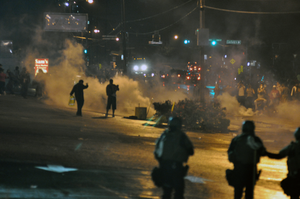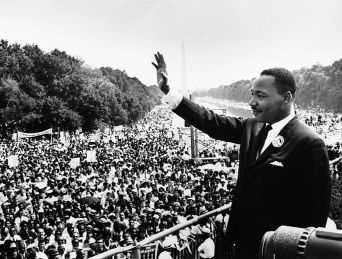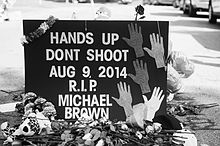We live in the 21st Century and yet racism exists in every corner of the United States. The most advanced, developed country in the world discriminates against people every day. While the rights and opportunities of women, immigrants, and minorities rights also fail in comparison to that of white men, the black population seems to have it the worst. Black citizens are shot and killed by police twice as often as any other racial group. The Caucasian population uses five times as many drugs as African Americans, but African Americans go to prison for drug-related charges ten times more often than Caucasians. The average Caucasian household makes $91,405 each year, compared to $6,446 for the average African American household. These statistics, and many more, strongly suggest a racial problem, decades after Dr. Martin Luther King, Jr. lost his life seeking change.
But plenty of people believe otherwise. The Republican Party appears to have devised a strategy to avoid confronting racism: don’t talk about it. But even with this plan, Republicans have been caught discussing the issue. Louisiana Governor Bobby Jindal said, “Racism wouldn’t exist if minorities would just act like white people.” In response to recent African American shootings, “It is playing the race card and I think it’s disgraceful,” a FOX News correspondent said. Another FOX News correspondent said, “You know who talks about race? Racists.” These Republicans are trying to ignore the issue of race and blame the existing problems on others.
The race problem only escalated following the shooting in Ferguson, Missouri. On August 9 of this year, black teenager Michael Brown was shot and killed by white police officer Darren Wilson. Brown was not armed at the time of the shooting. Just days ago, a grand jury decided that Wilson would not be indicted. This decision led to an uproar in Ferguson, resulting in nonviolent and violent protests. People were injured, property was damaged, and cars were burned in the hours and days after the grand jury announcement. There were also many protests around the country over the decision, including in Boston, New York, Los Angeles, Dallas, and Atlanta. Because many people did not believe this shooting to be a race problem, they were appalled by the violent reactions. But as political comedian Jon Stewart said, “If there’s nothing to justify the anger and protest in these communities, why would so many individuals around the country spend their precious, hard earned…time protesting a non existent problem?” There would not have been protests had race not been an issue.
Political analyst Bernie Goldberg is one who believes that race did not play a part in this event, saying, “Ferguson, Missouri is not Salma, Alabama.” But is it? Many of the protests related to Ferguson were not violent. As such, how different are they than when Dr. King protested during the Civil Rights Movement?
During the 1960s, Dr. King was not trying to defy the law. He respected the rule of law. But he was attempting to address the unjust laws that resulted in abuse to a whole race of people. He appreciated and recognized men in government. In his Letter From a Birmingham Jail, he treated his fellow clergymen with respect. He answered their questions and addressed their concerns. Dr. King advocated nonviolent protest as the most effective way to bring about change, writing, “Nonviolent direct action seeks to create such a crisis and foster such a tension that a community which has constantly refused to negotiate is forced to confront the issue. It seeks so to dramatize the issue that it can no longer be ignored.” Would nonviolent protest be effective, or would they be tossed aside? Would racism in the United States be taken more seriously?
Unfortunately, racism is not going away anytime soon. The roots are too deep. Jon Stewart said, “Do you not understand that life in this country is inherently different for white people and black people… This isn’t all about just one man killed in one town. It’s about how people of color, no matter their socioeconomic standing, face obstacles in this country with surprising grace. Race is there and it is constant. You’re tired of hearing about it, imagine how ****ing tiring it is living it.” To combat this ongoing problem, we need a 21st Century Dr. King.
Racism is a difficult subject that continues to plague our country. To truly be the land of the free, we cannot only talk about racism when a controversial event hits the news. We must work to end racism every day, and only then will a meaningful impact be realized.



First of all, the figures you posted for average median income for Caucasian and African-American households were grossly inaccurate. Check out the real ones here: http://www.businessinsider.com/heres-median-income-in-the-us-by-race-2013-9
Other than that, I agree. The fact that Darren Wilson was not indicted, saying that the murder of Michael Brown was not a crime, again shows the persistent problem of race in our country. The connection to MLK and his championed theory of non-violent protest is very relevant. While there were riots following the Michael Brown decision, there have been non-violent protests sweeping across the nation. The protests won’t change the decision, but they have brought attention to issues of race on a larger scale than they have been in recent history. This is what MLK intended non-violent protests to do: to bring the public face to face with racial issues, forcing them to consider change. Maybe a second wave is on the way. Who knows.
LikeLike